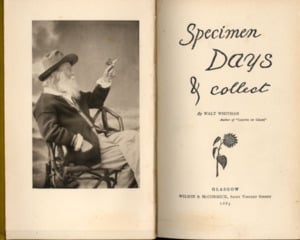
Hudson River Sights Walt Whitman
На этой странице вы найдете полный текст песни "Hudson River Sights" от Walt Whitman. Lyrxo предлагает вам самый полный и точный текст этой композиции без лишних отвлекающих факторов. Узнайте все куплеты и припев, чтобы лучше понять любимую песню и насладиться ею в полной мере. Идеально для фанатов и всех, кто ценит качественную музыку.

It was a happy thought to build the Hudson river railroad right along the shore. The grade is already made by nature; you are sure of ventilation one side—and you are in nobody's way. I see, hear, the locomotives and cars, rumbling, roaring, flaming, smoking, constantly, away off there, night and day—less than a mile distant, and in full view by day. I like both sight and sound. Express trains thunder and lighten along; of freight trains, most of them very long, there cannot be less than a hundred a day. At night far down you see the headlight approaching, coming steadily on like a meteor. The river at night has its special character-beauties. The shad fishermen go forth in their boats and pay out their nets—one sitting forward, rowing, and one standing up aft dropping it properly-marking the line with little floats bearing candles, conveying, as they glide over the water, an indescribable sentiment and doubled brightness. I like to watch the tows at night, too, with their twinkling lamps, and hear the husky panting of the steamers; or catch the sloops' and schooners' shadowy forms, like phantoms, white, silent, indefinite, out there. Then the Hudson of a clear moonlight night.
But there is one sight the very grandest. Sometimes in the fiercest driving storm of wind, rain, hail or snow, a great eagle will appear over the river, now soaring with steady and now overbended wings—always confronting the gale, or perhaps cleaving into, or at times literally sitting upon it. It is like reading some first-class natural tragedy or epic, or hearing martial trumpets. The splendid bird enjoys the hubbub—is adjusted and equal to it—finishes it so artistically. His pinions just oscillating—the position of his head and neck—his resistless, occasionally varied flight—now a swirl, now an upward movement—the black clouds driving—the angry wash below—the hiss of rain, the wind's piping (perhaps the ice colliding, grunting)—he tacking or jibing—now, as it were, for a change, abandoning himself to the gale, moving with it with such velocity—and now, resuming control, he comes up against it, lord of the situation and the storm—lord, amid it, of power and savage joy.
Sometimes (as at present writing,) middle of sunny afternoon, the old "Vanderbilt" steamer stalking ahead—I plainly hear her rhythmic, slushing paddles—drawing by long hawsers an immense and varied following string, ("an old sow and pigs," the river folks call it.) First comes a big barge, with a house built on it, and spars towering over the roof; then canal boats, a lengthen'd, clustering train, fasten'd and link'd together—the one in the middle, with high staff, flaunting a broad and gaudy flag—others with the almost invariable lines of new-wash'd clothes, drying; two sloops and a schooner aside the tow—little wind, and that adverse—with three long, dark, empty barges bringing up the rear. People are on the boats: men lounging, women in sun-bonnets, children, stovepipes with streaming smoke.
But there is one sight the very grandest. Sometimes in the fiercest driving storm of wind, rain, hail or snow, a great eagle will appear over the river, now soaring with steady and now overbended wings—always confronting the gale, or perhaps cleaving into, or at times literally sitting upon it. It is like reading some first-class natural tragedy or epic, or hearing martial trumpets. The splendid bird enjoys the hubbub—is adjusted and equal to it—finishes it so artistically. His pinions just oscillating—the position of his head and neck—his resistless, occasionally varied flight—now a swirl, now an upward movement—the black clouds driving—the angry wash below—the hiss of rain, the wind's piping (perhaps the ice colliding, grunting)—he tacking or jibing—now, as it were, for a change, abandoning himself to the gale, moving with it with such velocity—and now, resuming control, he comes up against it, lord of the situation and the storm—lord, amid it, of power and savage joy.
Sometimes (as at present writing,) middle of sunny afternoon, the old "Vanderbilt" steamer stalking ahead—I plainly hear her rhythmic, slushing paddles—drawing by long hawsers an immense and varied following string, ("an old sow and pigs," the river folks call it.) First comes a big barge, with a house built on it, and spars towering over the roof; then canal boats, a lengthen'd, clustering train, fasten'd and link'd together—the one in the middle, with high staff, flaunting a broad and gaudy flag—others with the almost invariable lines of new-wash'd clothes, drying; two sloops and a schooner aside the tow—little wind, and that adverse—with three long, dark, empty barges bringing up the rear. People are on the boats: men lounging, women in sun-bonnets, children, stovepipes with streaming smoke.
Комментарии (0)
Минимальная длина комментария — 50 символов.












